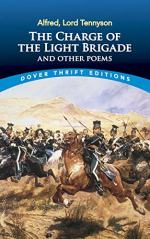|
This section contains 537 words (approx. 2 pages at 300 words per page) |

|
Soldier as Stupid Cowards in "The Charge of the Light Brigade" and "The Charge at Parihaka"
Summary: Most literature portrays soldiers at heroic, especially when they give up their lives for a cause. A different viewpoint is seen in two poems: Lord Alfred Tennyson's "The Charge of the Light Brigade" and "The Charge at Parihaka" by Jessie Mackay. Both poems question the unquestioning nature of soldiers heading into battle.
Lord Alfred Tennyson's poem, "The charge of the Light Brigade", coveys the message of idiotic heroism. The poem implies that dying for your country has a lot more to do with stupidity, rather than honour. Jessie Mackay's poem, "The charge at Parihaka" reveals that the soldiers are far from heroes, they are cowards and thieves. The poem suggests the charge made at Parihaka had a lot more to do with cowardliness, rather than heroism. Both these poems have similar structure to portray their message, since "The charge at Parihaka" is a parody of "The charge of the Light Brigade."
In "The charge of the Light Brigade", the soldiers know they are going to die but still go into the `valley of death'. This shows that they are heroes, but foolish. We can see this when Tennyson says:
Was there a man dismayed"
Not though the soldiers knew
Someone...
|
This section contains 537 words (approx. 2 pages at 300 words per page) |

|


